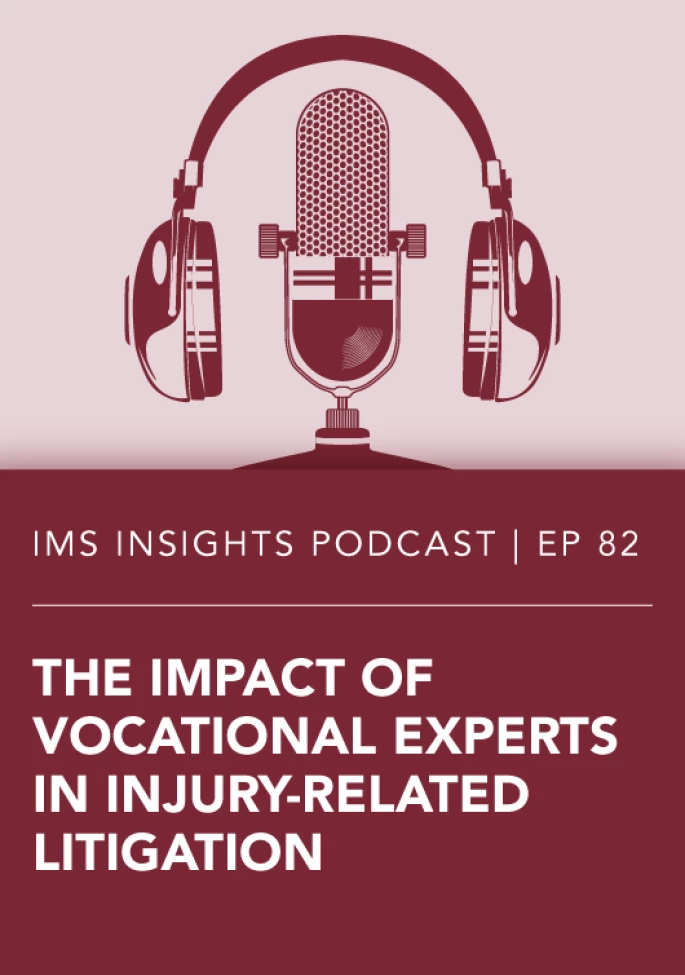From the IMS Insights Podcast Vault: Dr. Chuck Cowan, economics and statistical expert, shares his take on pandemic-era innovation as it relates to customer retention and market development. Listen above or read the interview transcript below. (Part 1 of 5; Originally recorded May 2021)
Hello and welcome to the IMS Insights Podcast. Today, we’re speaking with esteemed economist and statistical expert Charles Cowan, PhD about business development and innovation in a post-pandemic workplace.
Dr. Cowan is the Chief Executive Officer and co-managing member for the national statistics, finance, and economics consultancy, Analytic Focus. With more than 40 years of experience, Dr. Cowan is an IMS Elite Expert, specializing in the development of financial research and its use in improving shareholder values, economic impact studies, and risk management.
Teresa Barber:
Welcome Dr. Cowan. So great to have you here today. Thank you.
Chuck Cowan:
It's good to see you again Ms. Barber.
Teresa Barber:
Good to see you too. So, I wanted to talk to you about a couple of things. First, I wanted to talk to you about the pandemic, and I know everybody's talking about the pandemic these days, but in a lot of ways, it's really forced the hand of innovation, and companies and firms are having to look for new ways to connect with customers, markets, new ways of driving business, just getting work done. How do you see that companies have been innovating to keep work going?
Chuck Cowan:
So in a lot of cases, I want to differentiate between innovation as in doing the same thing but in a different way, versus doing something totally new. And so I wind up seeing businesses kind of in three categories. Not innovating (in which case, they're not doing all that well) or they are innovating in the sense of doing a better job of outreach and interacting with clients. But the third category was one that I found most interesting, which was new products and services that they didn't do before. I think one of the best examples is the chain Panera, which is a food chain for those who aren't fortunate to have one near them. And they have very good with different types of offerings that they had. But during the early stages of the pandemic, they wound up offering things that people couldn't get like fresh eggs.
Chuck Cowan:
So they actually turned themselves into a mini grocery mart where you could drive up and buy pastries, or you could buy sandwiches, but at the same time, you could actually just buy eggs and milk from them, which was a real help for people who couldn't go to the grocery because they were afraid to go out and here, they could just get it through a drive-through. I thought that was a great example of going beyond just innovation, but to think about a whole new service that they were offering that was outside of just reaching out to customers or having a convenient drive through where you used to have to walk in. I've seen that with a lot of companies, particularly in the retail area where new things are being offered, new services are being supported. So that there's more and more reasons to go back to these companies and take advantage of their offerings.
Chuck Cowan:
I'll also say that some of that has been going on in the past. So for example, you can walk into a pharmacy and get your flu shot. Now you can get your COVID shot, but the pharmacy's at the back of the store, and you've got to go past the candy bars, which for me is pretty much the kiss of death. So they get me buying something, even though I'm really going in to get a flu shot that is covered by my insurance. They're not making a whole lot of money. I'm not spending any money on my way back to the pharmacy, but to make up for the severe pain of getting that flu shot, I need to medicate myself with a chocolate bar.
Teresa Barber:
Of course.
Chuck Cowan:
Yeah.
Teresa Barber:
Well, and I think that's kind of one of the core definitions of innovation too, right? It’s just like in the Panera example, adapting the supply chain that they and those industry partnerships already have in place, but just looking at this immediately emerging customer need that's not getting met or just can't be met anywhere else. So, very interesting, Chuck.
Do you, in any of this innovation or in the way that companies have really been adapting, do you see any of this sustaining—fundamentally altering the way people and companies are working?
Chuck Cowan:
I do in a number of ways, but I'm going to also point out that for other industries and services, there's pretty much no change and it's going to cause some ripple effects. So as an example, I used to be in New York a couple of times a month—New York, DC, up and down the East Coast, doing depositions, attending meetings, things like that. And for those who don't know me, I live in San Antonio, Texas. So I'm a long way away, but it was easy to get to New York and DC. And so I'd be up there frequently.
Now, I haven't been outside of the state of Texas for a year and some odd months because everything is being done online. My interactions with people are being done online. I participate in a lot more conference calls. We do things over the phone, and I think people, particularly clients, are seeing that there are huge savings. They're not having to pay for my physical presence someplace or a physical presence of my staff. So that's going to make a big change, and it's going to reduce the expenses for these companies.
Chuck Cowan:
So for some companies, there is a definitely a different way to work. And I think that'll just continue. I think the pandemic brought about some change that was going to occur anyway, but it was going to occur slowly. Now, the question is, what does the savvy company do to forecast future change like that? So for example, Cisco company, which offers online services and has been offering online services since the late '90s. They have a war room. And it seems when you're talking to people like you're in the same room with them. I believe that that'll be the next big innovation and allow people to be much more interactive than they currently are where you are thinking that you are dealing with this box here, and then this box here, and this box here.
Chuck Cowan:
So for example, while we're talking, Teresa, I'm looking at you in a little box above the box where I am on the screen, but that's not ... I don't think that that's going to happen in the future. I don't think that's going to continue into the future. I think that all these companies will innovate and offer better services that will allow you to interact more. And part of the advantage of that is also going to be that you'll have much more in depth discussions with clients if you're offering a service, or if you are speaking with your own staff, it will give you much better opportunities for training.
So I'd say that the pandemic has led to some changes, but what people really should learn is, "Wow, if this change occurred in this short amount of time, what can we look forward to in the future? that I could plan for and think about so that I can take advantage of these changes and build it into expectation in my investment for the future?"
Chuck Cowan:
Now, having said that, I would also point out that there are some companies that are suffering. I was one of Delta (airline's) best customers. And now I haven't been on Delta for a year and a half. And I used to be at the diamond level in terms of traveling. So I'd get on the plane and lots of times people knew my name because they saw me every other week. And it was nice having all these friends at Delta, but the problem is, is that now I don't do business travel. I don't have an expectation of doing business travel anytime in the near future. And I can't be the only one. I'm thinking that all the airlines are going to be suffering because of fewer business customers, which was their bread and butter.
Chuck Cowan:
And it's not just the airlines. Amtrak, which had a lot of movement of people between, well, in the Northeast corridor, that's going to be cut back for the same reasons. Hotels. Living in San Antonio, we rely a lot on tourism because of the Riverwalk and people have sports events and other types of things that's going to be cut back. And part of that is because of the cutback on conferences. People realize that they don't have to be physically present at a conference to hear a presentation. So they're going to be a lot more virtual conferences, which again, is going to build one sector of the economy but it's really going to devastate a lot of hotels. Las Vegas well will suffer, but they will probably innovate faster than anybody.
So the idea is that again, there are some companies that are benefiting from this, but they're doing so while other companies are really struggling and having to retool and rethink their business models. So while we talk about how the pandemic has brought about a lot of positive change, I do think that there's also going to be a fair amount of upheaval.
Thank you to Dr. Charles Cowan for speaking with us today, and a special thanks to our listeners. At IMS, we’re trusted to deliver integrated trial services for the most influential global firms. It’s been our privilege to serve our clients on more than 20,000 cases and over 2,000 trials. Be sure to subscribe to our podcast and join us next time on the IMS Insights Podcast.
View this content on The National Law Review: Customer and Market Development in a Post-Pandemic Workplace (natlawreview.com)






